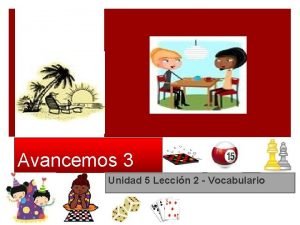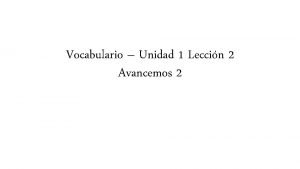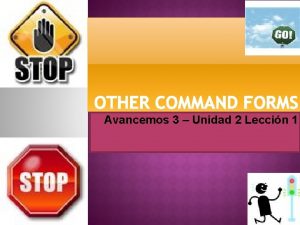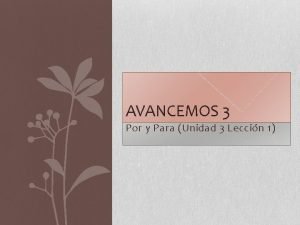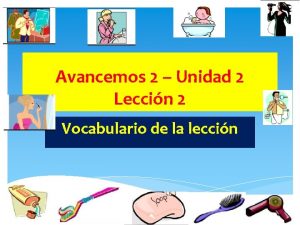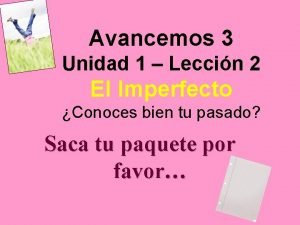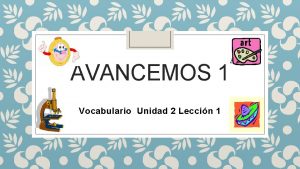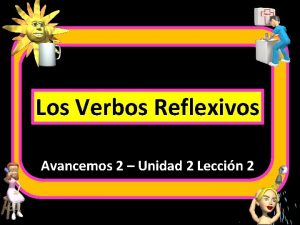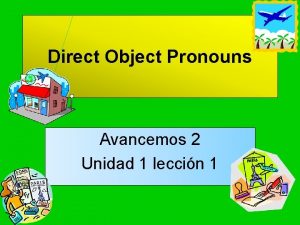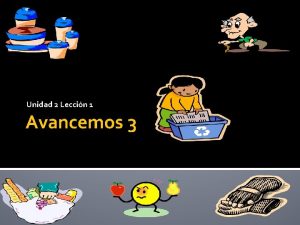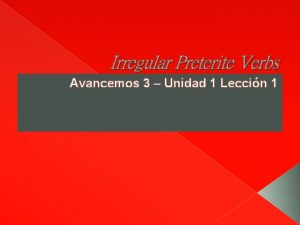AVANCEMOS 3 Por y Para Unidad 3 Leccin











- Slides: 11

AVANCEMOS 3 Por y Para (Unidad 3 Lección 1)

The Uses of Por and Para The prepositions por and para have distinct uses in Spanish. Por and Para can change meanings depending on usage. They are not interchangeable. There are distinct rules to follow when deciding which one you should use. Por and Para are easily confused if you do not pay attention to their usage.

Use POR to indicate: • How long something lasts. • Vivimos en Salvador por muchos años. • Estuvieron discutiendo por una hora. • El verano pasado, fui a México por dos semanas. • An exchange. • Cada día pagamos más por el petróleo. • Cambiamos la silla vieja por una nueva. • Pagué veinte dolares por el libro.

Use POR to indicate: • The cause of something (“because of”) • No tenemos agua por la sequía. • El partido terminó por la lluvia. • Se pelearon por un programa de televisión. • The idea of passing through * (Can also mean along, • El tren pasa por Panamá. • Ellos corrieron por la playa. • Yo caminé por el parque ayer. beside, by)

Use POR to indicate: • Doing something in place of or instead of someone else. • Estoy muy enfermo. ¿Puedes trabajar por mí? • Quiero hacerlo por usted. • A manner or means of completing an action. (communication/transport ation/via) • Hablamos por teléfono. • El turista viene por tren. • Compré los regalos por internet. • General rather than specific location/time (for, about, around) • ¿Hay un basurero por aquí? • Nos reunimos por la plaza. • Comemos por el mediodía.

Use POR to indicate: (**These examples are not in • Purpose or goal (to get, to obtain, to pick up, etc) • Mamá fue a la tienda por pan. • Ella salió por el helado. packet, please add) • Passive voice constructions (by) • The book was written by Ernest Hemingway = El libro fue escrito por Ernest Hemingway. • The dog was found by the teacher = El perro fue encontrado por la maestra.

Some expressions that use POR • Por favor • Please • Por fin • Finally • Por ejemplo • For example • Por la mañana/tarde/noche • In the morning/afternoon/night

Use PARA to indicate: • The purpose of an action (in order to). • Leemos el periódico para informarnos. • Estoy estudiando para aprender más. • For whom something is done. • Damos una fiesta para mamá. • Compramos el carro para ti

Use PARA to indicate: • Destination (for/to) • Salgo para Panamá mañana. • Yo camino para la escuela todas las mañanas. • Recipient of an item (who or what something is for). • El anillo es para ella. (who - for her) • Este regalo es para mi abuela. (who - for my grandma) • Estos libros son para la clase de español. (what - for Spanish class)

Use PARA to indicate: • An opinion • Para mí, la innovación es muy importante. • Para ella, es mejor proteger las especies en peligro de extinción. • A deadline • Hay que terminar la tarea para mañana. • Yo necesito el papel para lunes. • A comparison or contrast • Miguel es alto para tener dos años. • Para un perro gordo, él corre muy rápido. • Para un hombre viejo, él baila bien.

Práctica – 1. Choose either POR or PARA. 2. Give the reason for each choice. POR o PARA ¿Por qué? 1. 2. PARA 1. POR/PARA 1. POR 1. PARA Recipient of an item (the gift) A manner or means of completing an action (via or through the internet) 3. Recipient of an item (who or what something is for) 4. Exchange 5. Manner or means of completing an action/in order to 6. Idea of passing through (in this context means “by or beside the house”) 7. In order to (congratulate Clara).
 Avancemos 2 unidad 3 leccion 2
Avancemos 2 unidad 3 leccion 2 Avancemos 3 unidad 3 leccion 1
Avancemos 3 unidad 3 leccion 1 Avancemos 2 unidad 1 leccion 1
Avancemos 2 unidad 1 leccion 1 Unidad 1 leccion 2 avancemos 3
Unidad 1 leccion 2 avancemos 3 Avancemos 3 unidad 3 leccion 1
Avancemos 3 unidad 3 leccion 1 Avancemos 2 unidad 2 leccion 2
Avancemos 2 unidad 2 leccion 2 Avancemos 1 unidad 2 leccion 1
Avancemos 1 unidad 2 leccion 1 Unidad 1 leccion 1 avancemos 3
Unidad 1 leccion 1 avancemos 3 Avancemos 3 unidad 3 leccion 2
Avancemos 3 unidad 3 leccion 2 Avancemos 2 unidad 2 leccion 1
Avancemos 2 unidad 2 leccion 1 Eranare
Eranare Unidad 3 leccion 1
Unidad 3 leccion 1
